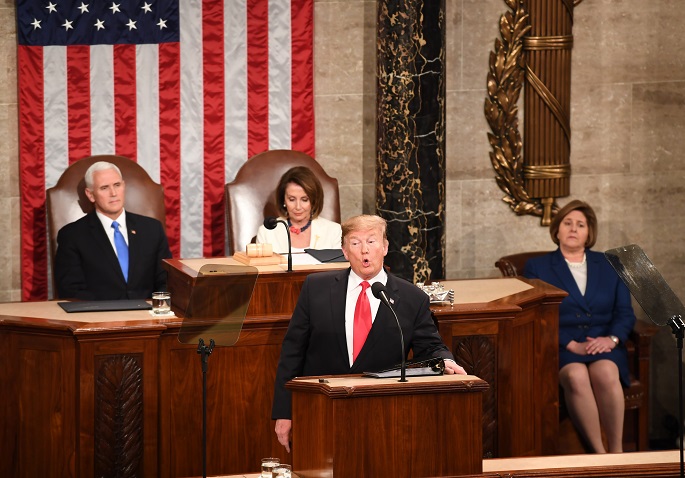Trump vows to end HIV spread within 10 years, critics skeptical
Published : 06 Feb 2019, 23:37
U.S. President Donald Trump has unveiled a bold plan to stop spread of HIV within a decade in the United States despite challenges posed by his lack of action to improve healthcare system.
In the annual State of the Union address delivered on Tuesday night, Trump urged his audience in Congress to work on to "eliminate the HIV epidemic" in the country "within 10 years."
This is the second time that Trump used his annual speech in the Congress to make big promises in beating back health scourges. Last year, Trump set a red flag to tackle opioid crisis but the money for a wide expansion of addiction treatment is still lacking as he prioritized to cut back the country's healthcare services.
In the United States, more than 1 million people aged 13 and older are living with HIV infection, with an estimated 15 percent unaware of their status, and approximately 56,000 new infections occur each year, according to National Institutes of Health (NIH).
Trump based his ambitious pledge on "scientific breakthroughs" in recent years. It did hold some water as the Food and Drug Administration approved three new drugs in 2018 to fight the global epidemic and at least one HIV vaccine has been put into clinical trial with promising results.
However, as the epidemic disproportionately affects racial and ethnic minorities, women of color, and men who have sex with men, the drive to end the HIV spread is more a social issue than a scientific one.
AIDS United, a non-profit organization, said in a statement that they "are cautiously encouraged" by Trump's promise, since "this administration's actions speak louder than words and have moved us in the wrong direction."
Trump proposed in his fiscal 2019 budget to cut the domestic HIV/AIDS program by 43 million U.S. dollars and worked to roll back the healthcare services in the Obama era.
"The President's attacks on the Affordable Care Act and proposed cuts to non-defense discretionary spending have threatened to undermine our efforts to end the HIV epidemic," according to AIDS United's statement.
The disparity among populations to have access to medical protections made the situation worse.
African American and Hispanics are the most vulnerable group of HIV infections, but they are poorly covered by healthcare services like Medicaid and Medicare.
The Kaiser Family Foundation, a non-profit organization on healthcare issues, cited "poverty, lack of access to health care, lack of awareness of HIV status, and stigma" as challenges for the epidemic among the most vulnerable communities.
Trump didn't make substantial moves in fighting HIV/AIDS in his first two years in office. Medicaid is "the single largest source of coverage for people with HIV in the U.S.," according to Kaiser Family Foundation, but the Trump administration encouraged states to cut funding for the program.
A recent proposal made by Trump on the reform of Medicare would dismantle most of protections for people living with serious conditions, like HIV and may threaten to "reignite the domestic epidemic as opposed to positioning us to end it," according to the AIDS United.
The epidemic prevention has not been on Trump's high agenda, making his ambitious 10-year strategy suspicious. The Presidential Advisory Council on HIV/AIDS did not meet at all in 2018, according to a report released by the Fenway Institute, an LGBTQ health organization.
Trump has not appointed a new director for the White House Office of National AIDS Policy since its previous chief resigned in January 2017. The office's page within the White House's official website showed a 404 error: That page cannot be found.


